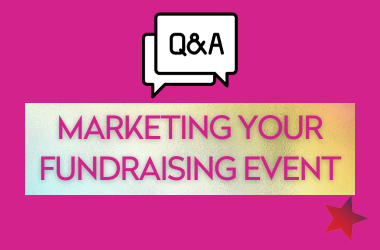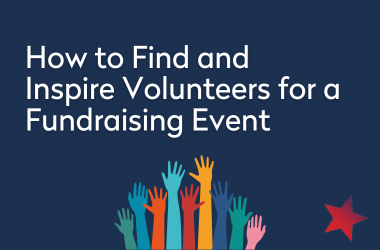Q&A: Planning a Performing Arts Fundraising Event
Event Fundraising in the Performing Arts can be a Great Way to Raise Funds
There are a number of ways to fundraise money for a performing arts organization or cause. One of the most collaborative ways to fundraise is by hosting an event. There are many steps to consider when planning a fundraising event. Depending on your intention for fundraising as well as the size of the event, there are a number of factors to consider. To help gain perspective by speaking to experience, nextSteps connected with Pentacle’s former Marketing Associate, Brittany Couch, and former Development Associate, Dorothy Chen. These two individuals have a wide range of fundraising experience, including their support in organizing the Pentacle Legacy Project.
1. Can you talk about your previous experience planning fundraising events?
Dorothy: The majority of my formidable fundraising event experiences occurred while I was on staff with Girls on the Run NYC (GOTR NYC). GOTR NYC’s mission is to inspire girls to be joyful, healthy and confident using a fun, experience-based curriculum which creatively integrates running. While I was at GOTR NYC, we hosted various types of fundraising events from fitness activities, such as a spin class or barre class that was donated to the organization, to wine tastings, to our annual benefit event. The annual benefit also ranged from being hosted at a bar to a penthouse event space to a large bowling venue. Due to the pandemic, GOTR NYC engaged with Trivia Hub to host their first annual fundraising event, “Girls on the Run NYC Trivia Night” in 2021, and they will be having their second annual trivia night in 2022. Attending GOTR NYC’s trivia night helped me learn how to plan Pentacle’s first virtual trivia night, which took place during the summer of 2021.
Brittany: Fundraising events always seem to summon a bit of dread. At times it can seem like there isn’t enough of a positive correlation between how much work you put into them and the rewards received from them. This is why it is so important to set clear goals right from the start and continue to check in with those goals as you move through the planning process.
2. What first steps do you usually take when planning a performing arts fundraising event?
D: The first steps to planning a fundraising event are to (1) specify who the audience would be for the event, (2) define how people are connected to the mission of the organization or entity that the event will be supporting, and (3) write down what mission-related elements may take place during the fundraising event.
B: After solidifying my budget, I create a 2-3 month marketing timeline. Then I start on a press release. Getting that language together really helps to hone in on a goal and a message.
3. How do you get volunteers when you’re planning a performing arts fundraising event?
D: When volunteer needs for the fundraising event are solidified, the first ask for volunteers generally goes to the organization’s audience/mailing list. Simultaneously or next, I may ask personal friends and/or family members if they are interested in volunteering at the event, and if they have a friend that would also be interested in joining them. If more volunteers are needed, I may decide to post on a volunteer site (ex. VolunteerMatch, Engage [formerly All for Good], JustServe, United Way, Do Something). For dance organizations, dance.nyc may also be a good place to post volunteer opportunities.
At some fundraising events, volunteers may only need to help for a portion of the event; therefore, they can still enjoy the event as an attendee while supporting the organization or entity. I’ve experienced events where volunteers will receive a discounted ticket to the event, and they only need to volunteer for an hour of the 3+ hour event.
B: Word of mouth is a powerful tool. Often there are friends of staff that may be interested or younger professionals who could benefit from the exposure. It is also helpful to have a good reputation for treating staff and volunteers well. That includes providing adequate information about tasks and responsibilities. Secondly, I reach out to organizations or educational programs whose constituents may have some direct benefit from being involved in the event in some capacity.
4. How do you get people to donate tangible items for a performing arts fundraising event, such as auction items or tiered prizes?
D: Going to one’s audience/network is again the first step to asking if people have potential auction items or prizes they can donate to the fundraising event. These folks may also know others with items they can donate. I also think about personal friends and family members who may have an item or items that can be donated, then I ask them what they are able to donate.
Ideas for auction items and prizes can be generated by relating them to the mission and programs of the event host. Or, they can be universally agreeable items (ex. plane ticket vouchers, ClassPass membership, tasting menu experience at a restaurant). It’s good to think about what kinds of items the organization or entity’s audience would want to bid on with the hopes of winning! Items can also be connected to the location of the event host, such as local shops or restaurants that would be able to donate items, and in turn, get some new potential customers.
Phone calls and emails are ways to connect, as are in-person visits to the shops or restaurants, etc., to share the mission, the fundraising event, and to connect with those who may be able to donate items.
B: Highlighting the engagement of a new audience for the partner is a great way to garner support from partners and friends. Frame the donation as an opportunity for them to reach new people with their message! It is also important that you find some connection between your audience and your partner’s audience. A dancewear company may be interested in exposure to attendees of a dance festival but a golf club company won’t necessarily understand why they should be speaking to you.
5. Are there any online platforms that you’ve used or have had great reviews that you recommend, for planning performing arts fundraising events?
D: As a fundraising platform, I would recommend GiveLively. It’s free for nonprofits, has very straightforward text to give capability, allows for multiple fundraising pages, and has an option to create teams for various campaigns. DonorBox is another great online fundraising event platform, and the donation box form can easily be embedded onto a webpage. For online auctions, I have seen 32 auctions work well for smaller organizations.
5. What kind of obstacles or challenges have you faced with planning previous fundraising events?
D: I think the most challenging portion, or when the most obstacles are faced, is during the planning and implementation process. And if it’s the first attempt at new ideas for a fundraising event, there will naturally be more initial obstacles to take on, such as coordinating with the new and multiple vendors, as well as getting key players for the event on the same page.
B: Diversifying donation types is always a goal and always a challenge (i.e. individuals, corporations, auctions, merchandise, etc.). However, the biggest challenge in creating a fundraising event is adequately balancing your time spent in planning the event compared to the amount of funds raised.
5. Can you share your experience with one of the best fundraising events you’ve attended, and why it felt so impactful?
D: Personally, the best fundraising events I have attended are the ones where I am with good friends, family, and colleagues. I’ve enjoyed a wide range of fundraising events from a fitness class to a sit-down gala, and what makes them impactful is the people I get to be with while I’m there.
B: My favorite fundraising events have not felt like a fundraising event at all! They were experiences or services. that were relevant. That the money was going toward a cause I supported was a MAJOR plus. Lastly, I have found that the single most impactful tool in successful fundraising campaigns has been the utilization of personal contacts. This can be difficult if you’re uncomfortable asking for money or support, but it is a game changer.
6. In your opinion, what determines the success of a performing arts fundraising event?
D: In my opinion, funds raised from the event to enable the organization or entity to continue its mission and programming would deem the event successful. Additionally, I believe a fundraising event is successful if the attendees and parties involved enjoyed the event and would attend a future fundraising event with the host organization or entity, therefore strengthening the mission of the organization and cultivating its current and future supporters.
B: A successful fundraising event will encourage and excite their community about the work they are contributing to. Donors will look forward to hearing about how their donation made a difference! It will also create a sense of urgency and willingness to give in the future. In short, you’re creating long-term relationships. Lastly, a successful fundraising event will attract repeating donors as well as new donors!
Related Resources
Q&A: Marketing Your Fundraising Event
Q&A: Marketing your Performing Arts Fundraising EventUnveiling the Power of Event Fundraising: Elevate Your Fundraising Efforts! Hosting an event stands out as one of the most collaborative ways to raise funds. From planning to execution, various steps and factors...
How to Find and Inspire Volunteers for Your Fundraising Event
How to Find and Inspire Volunteers for Your Fundraising EventFinding volunteers for your performing arts fundraising events It can be challenging to find quality volunteers for your performing arts fundraising events, but it’s an important element of your event plan....


